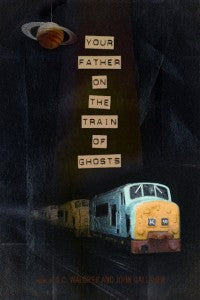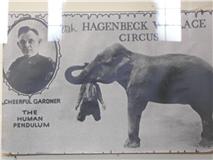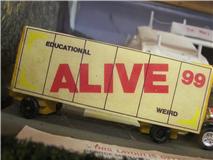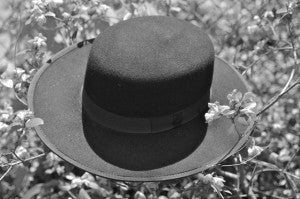 [/caption]
[/caption]
Don’t Answer the Door (or Do)
In this second of six part series, poets John Gallaher and G.C. Waldrep continue to explore their experience writing Your Father on the Train of Ghosts, the product of a year-long exchange of poems via email, discussing the interior life of the poems and the collaborative nature of their book, a collection that John Ashbery referred to as one where the pair write within "a growing region, but there are others too, regions/ and examples of regions,' together with 'rhubarb futures' and 'this child's chalk drawing on the sidewalk/of a sea monster on a Tilt-a-Whirl.' 'We are free/for a limited time,' one of them writes (we don't know who wrote what), and that augurs a peculiarly American kind of happiness." John Gallaher: One of the things I like about that epigraph from Spicer that we were talking about last time (“Like somebody knocking on your door at three in the morning, you know. And you try to pretend that you aren’t breathing"), is a lot of it depends on how one reads the “you know.” Is he meaning the person knocking on your door is someone you know, or is he meaning the “you know” as simply a gesture, asking if the people in the audience are with him, understanding him. My feeling is he means it in the second way, but sometimes when I read it, when I’m braced with it out of context, it feels like the first way. This, then, is another version of your definition of conservative as “saving with” perhaps? Which feeds into our desire to conserve, to take care of, to minister to. Here’s one of our poems on that subject:
AND AS THEY WAITED IN THEIR BASKETS
ON THE HILLSIDES IT BEGAN TO RAIN
John Gallaher: One of the things I like about that epigraph from Spicer that we were talking about last time (“Like somebody knocking on your door at three in the morning, you know. And you try to pretend that you aren’t breathing"), is a lot of it depends on how one reads the “you know.” Is he meaning the person knocking on your door is someone you know, or is he meaning the “you know” as simply a gesture, asking if the people in the audience are with him, understanding him. My feeling is he means it in the second way, but sometimes when I read it, when I’m braced with it out of context, it feels like the first way. This, then, is another version of your definition of conservative as “saving with” perhaps? Which feeds into our desire to conserve, to take care of, to minister to. Here’s one of our poems on that subject:
AND AS THEY WAITED IN THEIR BASKETS
ON THE HILLSIDES IT BEGAN TO RAIN
I meant to write “saved from drowning” but wrote “drowned from saving” instead. When I look up from my notebook, I realize I am writing once again at the desk made out of the war.
Later, after the lights are turned off, I hear the jake brakes of passing trucks and litanies the crickets make. It’s as if at some point, or maybe in some other, earlier life, they’d all been weavers, artisans of great skill, but then, somehow, forgot how that all went.
In the fields outside town, the crickets are trying to piece something impossibly complex together, only this time it’s going to work, this time it’s going to be about acoustics and devotion, rather than about covering the body.
It’s the war, I tell myself—in the dream— before letting each fragment drop.
Come down to the water, whisper the cripples on the tall banks of the levee. We call what we’re doing dancing because we like that word better than some other words. It’s the sort of thing a god might do, a god in the shape of a river, in the shape of a bird, in the shape of a bone tucked inside a scar.
G.C. Waldrep: As it happens I just finished reading John Yau’s recent monograph on the painter Jasper Johns, and I can’t stop thinking about the comment he makes opacities in some of Johns’s paintings—the idea that overpainting or mere overthinking conceals something, that the art object simply is incapable of delivering in an explicit way. In particular, a door. It’s not so much that we want to know what the door conceals—what’s behind the door—as that something we can’t see is inside the door itself. So, when I think about a poem like “And as They Waited in Their Baskets on the Hillsides, It Began to Rain,” I’m wondering less about what’s behind it—what it “means”—than I am about what inheres within it, within the plane of experience represented by the poem, inaccessible to anyone else.
What if the knocking is coming not from the other side of the door, but from inside the door itself?
JG: Well, then it’s time to call pest control.
I was reading about groups of musicians, or a scientist-musicians, awhile back, who have created (or translated might be a better term) music from DNA and proteins. So, following that, the door could be singing. Either way, it’s just about as mysterious.
So, when I think about a poem like “And as They Waited in Their Baskets on the Hillsides, It Began to Rain,” I’m wondering less about what’s behind it—what it “means”—than I am about what inheres within it, within the plane of experience represented by the poem, inaccessible to anyone else.
What if the knocking is coming not from the other side of the door, but from inside the door itself?
JG: Well, then it’s time to call pest control.
I was reading about groups of musicians, or a scientist-musicians, awhile back, who have created (or translated might be a better term) music from DNA and proteins. So, following that, the door could be singing. Either way, it’s just about as mysterious.
 One of my pet theories is regarding empathy, the idea that if one were empathetic enough one could walk through the door itself, as we’re all mostly empty space. In that economy, it’s more about the communal nature of all things (in the science version, which is where I feel most comfortable keeping it), than a question of singular operators. That’s one of the things I really liked about our collaboration. It was ours. We were we, and the poems invoked that we. As Oppen has it, “the shipwreck of the singular.” And still the door continues to be the door. It opens and closes. It knocks and sings.
You can read Part 1 of the discussion here
[caption id="attachment_401" align="alignnone" width="210" caption="G.C. Waldreps Hat. BOA Poet Hat."]
One of my pet theories is regarding empathy, the idea that if one were empathetic enough one could walk through the door itself, as we’re all mostly empty space. In that economy, it’s more about the communal nature of all things (in the science version, which is where I feel most comfortable keeping it), than a question of singular operators. That’s one of the things I really liked about our collaboration. It was ours. We were we, and the poems invoked that we. As Oppen has it, “the shipwreck of the singular.” And still the door continues to be the door. It opens and closes. It knocks and sings.
You can read Part 1 of the discussion here
[caption id="attachment_401" align="alignnone" width="210" caption="G.C. Waldreps Hat. BOA Poet Hat."] [/caption]
G.C. Waldrep's previous collections of poetry include Goldbeater's Skin (2003), winner of the Colorado Prize; Disclamor (BOA, 2007); and Archicembalo (2009), winner of the Dorset Prize. His work has appeared in many journals, including Poetry, Ploughshares, APR, Boston Review, New England Review, Threepenny Review, Colorado Review, Tin House, Harper's, and The Nation, as well as in Best American Poetry 2010. He was a 2007 National Endowment for the Arts Fellow in Literature and received a 2008 Gertrude Stein Award for Innovative American Poetry. His anthology of creative, critical, and personal responses to the life and work of Paul Celan, co-edited with Ilya Kaminsky, is forthcoming from Marick Press. He lives in Lewisburg, Pa., where he teaches at Bucknell University, directs the Bucknell Seminar for Younger Poets, and serves as Editor-at-Large for The Kenyon Review.
[caption id="attachment_1212" align="alignnone" width="103" caption="John Gallaher. BOA poet. "]
[/caption]
G.C. Waldrep's previous collections of poetry include Goldbeater's Skin (2003), winner of the Colorado Prize; Disclamor (BOA, 2007); and Archicembalo (2009), winner of the Dorset Prize. His work has appeared in many journals, including Poetry, Ploughshares, APR, Boston Review, New England Review, Threepenny Review, Colorado Review, Tin House, Harper's, and The Nation, as well as in Best American Poetry 2010. He was a 2007 National Endowment for the Arts Fellow in Literature and received a 2008 Gertrude Stein Award for Innovative American Poetry. His anthology of creative, critical, and personal responses to the life and work of Paul Celan, co-edited with Ilya Kaminsky, is forthcoming from Marick Press. He lives in Lewisburg, Pa., where he teaches at Bucknell University, directs the Bucknell Seminar for Younger Poets, and serves as Editor-at-Large for The Kenyon Review.
[caption id="attachment_1212" align="alignnone" width="103" caption="John Gallaher. BOA poet. "] [/caption]
John Gallaher’s previous collections of poetry include The Little Book of Guesses (2007), winner of the Levis poetry prize, and Map of the Folded World (2009). His work has appeared in such journals as Field, Denver Quarterly, Ploughshares, New American Writing, Colorado Review, and The Kenyon Review, as well as in The Best American Poetry 2008. In 2010, he won the Boston Review poetry prize. He is currently co-editor of The Laurel Review, and, with Mary Biddinger, The Akron Series in Contemporary Poetics.
[/caption]
John Gallaher’s previous collections of poetry include The Little Book of Guesses (2007), winner of the Levis poetry prize, and Map of the Folded World (2009). His work has appeared in such journals as Field, Denver Quarterly, Ploughshares, New American Writing, Colorado Review, and The Kenyon Review, as well as in The Best American Poetry 2008. In 2010, he won the Boston Review poetry prize. He is currently co-editor of The Laurel Review, and, with Mary Biddinger, The Akron Series in Contemporary Poetics.
AND AS THEY WAITED IN THEIR BASKETS
ON THE HILLSIDES IT BEGAN TO RAIN
I meant to write “saved from drowning”
but wrote “drowned from saving”
instead. When I look up from my notebook,
I realize I am writing
once again at the desk made out of the war.
Later, after the lights are turned off,
I hear the jake brakes of passing trucks and litanies
the crickets make. It’s as if
at some point, or maybe in some other,
earlier life, they’d all been weavers, artisans of great skill,
but then, somehow, forgot how that all went.
the crickets are trying to piece something
impossibly complex together,
only this time it’s going to work, this time
it’s going to be about acoustics
and devotion, rather than about covering the body.
It’s the war, I tell myself—in the dream—
before letting each fragment drop.
Come down to the water, whisper the cripples
on the tall banks of the levee.
We call what we’re doing dancing
because we like that word better than some other words.
It’s the sort of thing a god might do,
a god in the shape of a river, in the shape of a bird,

